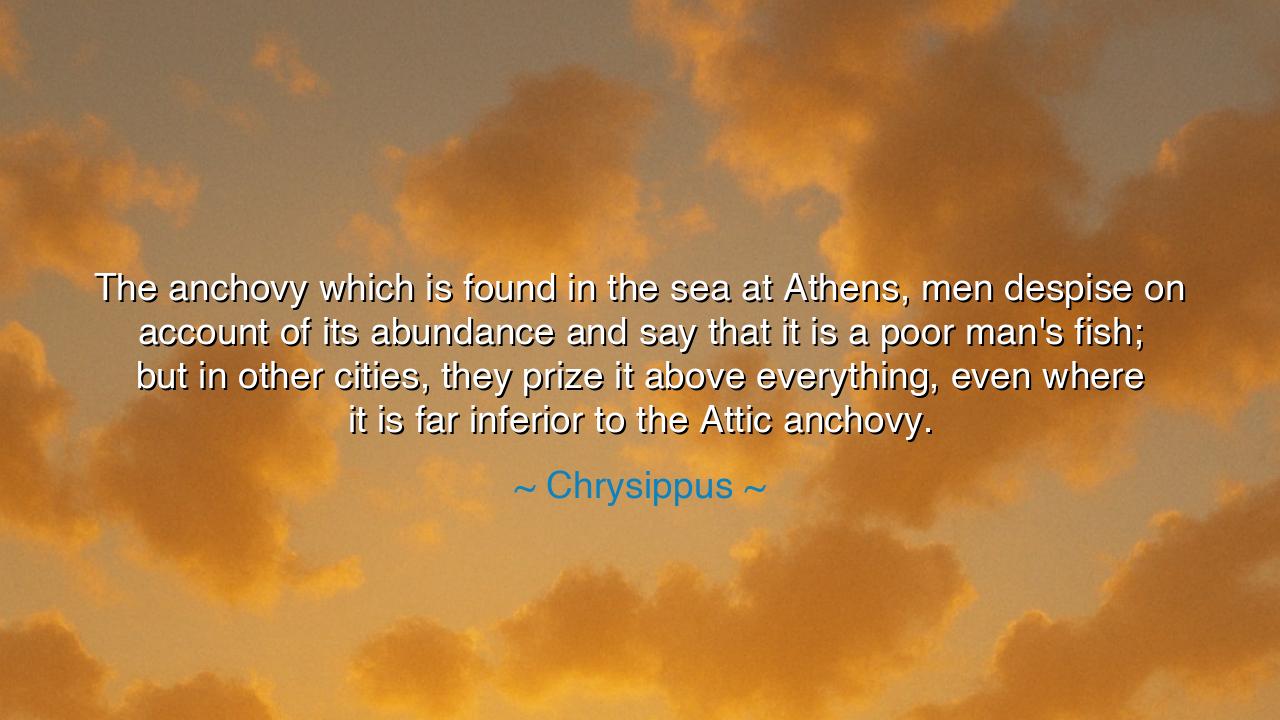
The anchovy which is found in the sea at Athens, men despise on
The anchovy which is found in the sea at Athens, men despise on account of its abundance and say that it is a poor man's fish; but in other cities, they prize it above everything, even where it is far inferior to the Attic anchovy.






Hear now, O seeker of wisdom, the teaching of Chrysippus, the great Stoic sage, who declared: “The anchovy which is found in the sea at Athens, men despise on account of its abundance and say that it is a poor man’s fish; but in other cities, they prize it above everything, even where it is far inferior to the Attic anchovy.” In these words lies a lesson not about fish, but about the blindness of the human heart, which often fails to honor what it already possesses. For what is common, though precious, is too easily cast aside as cheap; while what is scarce, though lesser in worth, is exalted as a treasure.
The ancients well knew that familiarity breeds contempt. The Athenians, surrounded by a sea brimming with anchovy, saw only its overabundance and called it lowly. Yet travelers in other lands, where such fish were rare and dear, treated them as delicacies beyond compare. Thus Chrysippus sought to show us that value is not always in the thing itself, but in the eye of the beholder, shaped by habit, scarcity, and perception. The lesson is profound: what you scorn today as ordinary, another might see as wondrous beyond measure.
Consider the tale of the poet Emily Dickinson, who lived most of her life in quiet seclusion. To her neighbors, she was but a strange woman, hidden away, scribbling verses on scraps of paper. Her words were abundant in her own home, almost overlooked by those around her. Yet when her poems were discovered after her death, the world prized them as treasures of immeasurable worth, jewels of insight that burn still in the hearts of millions. Like the anchovy of Athens, her words were too near, too common to be seen for what they truly were—until distance and rarity revealed their splendor.
This truth resounds across ages: the abundance of blessings blinds us to their value. The air we breathe, the water we drink, the warmth of the sun—all are despised by no one, yet few truly honor them. We pursue foreign luxuries, distant dreams, or rare possessions, believing them greater than the gifts already overflowing in our hands. Yet let these simple things vanish, and suddenly we discover they were riches beyond price. So too with family, with friendship, with health—treasures wasted in neglect until scarcity teaches us their worth.
Chrysippus’ anchovy, then, is a mirror to the human soul. It shows how desire is shaped not by truth, but by rarity. What is scarce appears noble; what is common, lowly. But wisdom calls us to pierce this veil, to see with eyes unclouded. True value lies not in scarcity, but in essence. The anchovy of Athens is not less nourishing because it is abundant; nor is the distant fish more excellent because it is rare. It is the same with the blessings of life—judge them not by their number, but by their nature.
Therefore, O listener, the lesson is this: Do not despise the gifts that surround you simply because they are plentiful. Look with reverence upon what others might overlook. Practice daily gratitude for the things near at hand, lest you wake one day to find them gone. Recognize the wealth that already lies within your grasp, and do not waste your years chasing lesser things dressed in the mask of rarity.
Practical action is simple, yet profound: Begin each day by naming the anchovies in your life—the things so common you have ceased to notice them. Speak thanks for them, honor them, and treat them with care. Let no friendship be too ordinary to cherish, no meal too simple to enjoy, no sunrise too common to behold with awe. In this way, you will live as one truly rich, not deceived by the illusions of scarcity, but grounded in the truth of abundance.
So remember the wisdom of Chrysippus: the anchovy of Athens is despised only by those who are blind to its worth. Open your eyes, O seeker, and honor what is already yours. For true wealth is not measured by what is rare, but by the heart that can rejoice in what is abundant.






AAdministratorAdministrator
Welcome, honored guests. Please leave a comment, we will respond soon